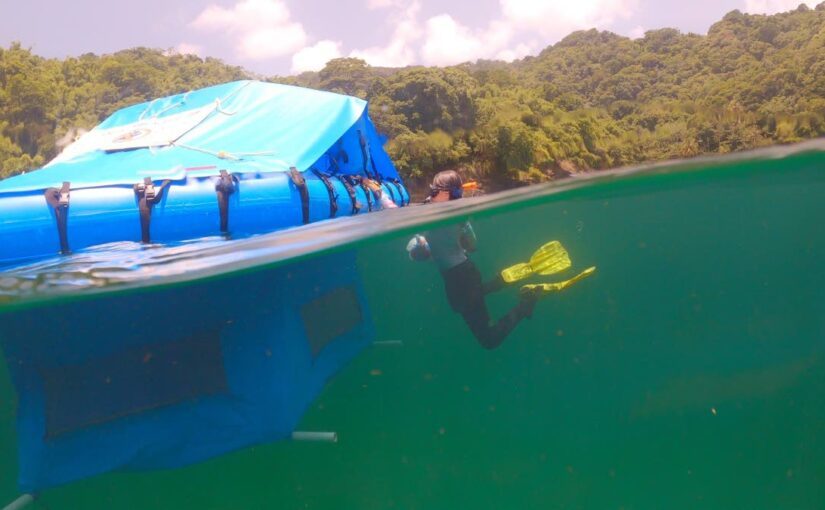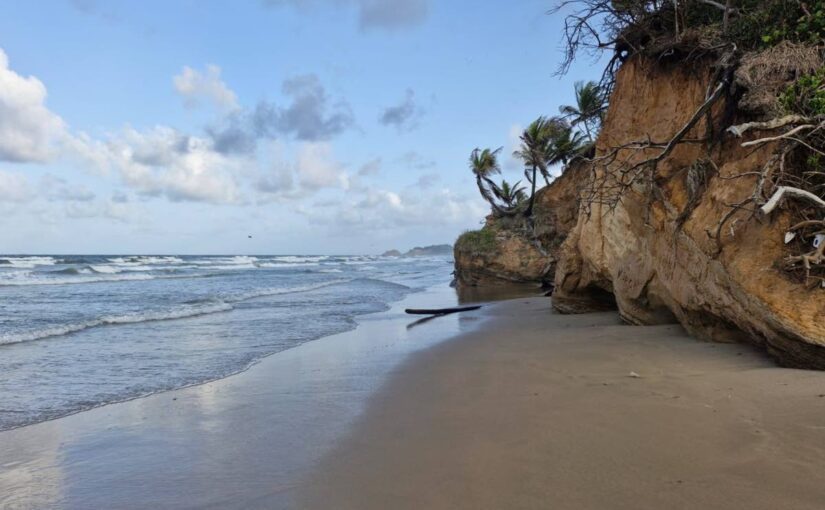An International study led by UAB researcher Ariane Arias-Ortiz, and published in Global Change Biology, has analysed methane gas fluxes in over a...
Vous n'êtes pas connecté
- English
- Français
- عربي
- Español
- Deutsch
- Português
- русский язык
- Català
- Italiano
- Nederlands, Vlaams
- Norsk
- فارسی
- বাংলা
- اردو
- Azərbaycan dili
- Bahasa Indonesia
- Հայերեն
- Ελληνικά
- Bosanski jezik
- українська мова
- Íslenska
- Türkmen, Түркмен
- Türkçe
- Shqip
- Eesti keel
- magyar
- Қазақ тілі
- Kalaallisut ; kalaallit oqaasii
- Lietuvių kalba
- Latviešu valoda
- македонски јазик
- Монгол
- Bahasa Melayu ; بهاس ملايو
- ဗမာစာ
- Slovenščina
- тоҷикӣ ; toğikī ; تاجیکی
- ไทย
- O'zbek ; Ўзбек ; أۇزبېك
- Tiếng Việt
- ភាសាខ្មែរ
- རྫོང་ཁ
- Soomaaliga ; af Soomaali
Rubriques :
 Maroc - RAWSTORY.COM - Raw Story - 10/Jul 17:09
Maroc - RAWSTORY.COM - Raw Story - 10/Jul 17:09
Warming Baltic Sea: a red flag for global oceans
Climate change combined with pollution from farming and forestry could flip northern Europe's Baltic Sea from being a sponge for CO2 to a source of the planet-warming gas, scientists studying told AFP.This should be a red flag, they warned, noting that other coastal marine zones around the world are trending in the same direction."We are at the forefront of these changes," said University of Helsinki professor Alf Norkko.The Baltic Sea –- connected to the Atlantic by the straights of Denmark, and surrounded by Germany, Poland, Finland, Sweden and the Baltic states –- has warmed at twice the pace of global oceans generally.Its relatively shallow waters are extremely sensitive to changes in the environment and climate.AFP recently accompanied Norkko, who leads the largest marine research station in the Baltic Sea, and some of his colleagues on a research excursion to the Finnish waterfront town of Hanko.Slender terns dart above the lush marsh-like landscape surrounding the over 120-year-old field station, a common sight along Finland's 1,100-kilometre (680-mile) coastline, which is dotted by more than 81,000 islands.Measurements conducted since 1926 show that average sea temperature have spiked by two degrees Celsius over the last 30 years."The Baltic Sea is basically a small bathtub compared to the global oceans," said doctoral researcher Norman Gobeler, an expert on marine heatwaves."We are seeing the first effects of the temperature increase."- Linking marine ecosystems to climate change -During one foray into the field, coastal ecologist and doctoral researcher Margaret Williamson –- sporting waist-high waders and sunglasses –- moved through a swaying, green reedbed collecting stems, roots and soil to measure CO2 levels."The Baltic Sea is really important for understanding what climate change is doing worldwide," said Williamson, who is part of a joint research project with Helsinki and Stockholm universities.Many coastal areas across the globe -- coral reefs, estuaries, and mangrove forests –- are among the planet's richest biodiversity hotspots, providing vital nurseries and habitats for hundreds of marine species.They are also the most vulnerable to the kind of changes observed in the Baltic.Up to now, oceans have been our most important natural ally in coping with global warming.Over decades, they have consistently absorbed 90 percent of the heat generated by human-induced climate change, and about a quarter of the carbon dioxide humanity injects into the atmosphere.But scientists say there is a lot we do not know about the capacity of oceans to continue serving as "sinks", or sponges, for our carbon pollution, Norkko noted."There has been a lot of emphasis on terrestrial forests' role as carbon sinks," he said. "Our coasts and oceans have been ignored. The question is, how much further the oceans can take of all these stressors?"- From carbon sink to carbon source? -Recent findings from the Finnish research station suggest coastal ecosystems in the Baltic Sea could start emitting greenhouse gases –- CO2 and methane –- instead of absorbing them, driven by both rising temperatures and environmental pollution.The ecological condition of many coastal areas has deteriorated due to the runoff from forestry and nitrogen and phosphorus-rich fertiliser used in agriculture, as well as untreated waste water.The overabundance of chemical nutrients leads to harmful algae blooms, and vast "dead zones" depleted of oxygen, a process known as eutrophication."A degraded ecosystem will be a net carbon source," Norkko said. "Our biggest concern is that what should be an efficient carbon sink could become a carbon source."Norkko said the changes already witnessed in the Baltic Sea should sound the alarm for coastal regions across the world."Many of the world's densely populated coastal areas are affected by eutrophication and this has a huge effect on the ability of coastal ecosystems to mitigate climate change," he said.While measures to protect and restore healthy marine ecosystems had been taken in the Baltic Sea and elsewhere, ramped up efforts are required to ensure their role as carbon absorbers.Pointing to the dark green, bubbly bladderwrack -- a threatened seaweed that anchors coastal marine ecosystems –- Norkko compared the algae with an "old growth forest", noting it lives up to 30 years in a robust coastal ecosystem."Once the bladderwrack sucks up carbon it stores it for a long time," he said. "That's why a healthy system is a buffer against change and is important to maintain."
Articles similaires
MOI stages symposium on environmentally conscious architecture
A forum on natural carbon sinks and low-carbon architecture was held by the Ministry of the Interior at National Chung Hsing University Sept. 2 in the...
Yeboah Sekyere writes: Effects of climate change and its impacts on food production in Ghana
Climate change is one of the most pressing challenges facing the world today, and its effects are particularly pronounced in Ghana. The country,...
Is Climate Change Sucking The Caspian Sea Dry? – Analysis
By Tarique Niazi Azerbaijan is making the most of its hosting of the UN climate summit (COP29) in November this year. Its president, Ilham Aliyev,...
Is Climate Change Sucking The Caspian Sea Dry? – Analysis
By Tarique Niazi Azerbaijan is making the most of its hosting of the UN climate summit (COP29) in November this year. Its president, Ilham Aliyev,...
NELGA – DAAD RESEARCH FELLOWSHIP IN CLIMATE CHANGE AND LAND GOVERNANCE
Applications are now open for the NELGA – DAAD Research Fellowship in Climate Change and Land Governance. The Network of Excellence for...
Work and play by the sea
People are hard at work in vacation places. Fortunate are those who vacation and are allowed into other working lives, other enterprises. Pat Ganase...
Forest industries welcome CCA report
The Australian Forest Products Association has welcomed the Sector Pathways Review released by the Climate Change Authority (CCA). Source: Timberbiz...
CANARI trains in drone technology for coastal mapping
The Caribbean Natural Resources Institute (CANARI) recently held training workshops in using drone technology for coastal mapping and monitoring in...
How low can we go? To cut the carbon that goes into buildings we need radical change
Buildings are a major driver of global heating, contributing 37% of all greenhouse gas emissions. While we know how to reduce operational carbon to...
Les derniers communiqués
-
Adobe Brings Conversational AI to Trillions of PDFs with the New AI Assistant in Reader and Acrobat
Adobe - 21/02/2024
-
Laura Frigenti takes the Helm as Chief Executive Officer of the Global Partnership for Education
Global Partnership for Education - 05/12/2022


